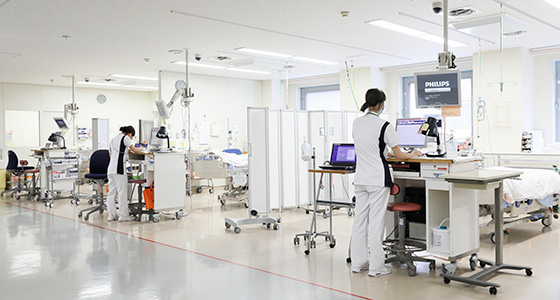- HOME
- Department
- Intensive Care Medicine
Intensive Care Medicine

(1) Overview
Intensive Care Medicine (ICU/CCU/HCU) treats and manages patients who are in serious condition regardless of the type of disease, such as patients who have undergone a physically demanding surgery or patients in severe condition who were transported to emergency outpatient care.
Patterns of admittance vary, from patients who are admitted to a room that was determined in advance, and emergency admittance for patients who are admitted as needed. For example, patients at times use the department after undergoing surgeries for diseases in the neurosurgery, cardiovascular surgery, and gastrointestinal surgery areas for the purpose of ensuring a steady recovery based on close management.
In addition, as patients who are admitted due to strokes also account for a certain percentage of patients, the department also has a stroke care unit (SCU) function. In the SCU, efficient and smooth treatment, management, and physical therapy is conducted from the early stages of a stroke with the aim of ensuring an early return to daily life.
(2) Policy
Intensive Care Medicine has as its motto to “ensure that patients are able to securely receive treatment and support patients to enable an early return to their former lives”.
In addition, in response to patients whose immune functions are in an unstable state, the department pays particularly close attention to the prevention of nosocomial infection.
(3) Our Strengths
SCU for Intensive Stroke Treatment
Intensive Care Medicine also has a stroke care unit (SCU) function that smoothly accepts stroke patients brought to the hospital by emergency transport, conducting early treatment and early physical therapy.
Immediate treatment and physical therapy after the onset of stroke is thought to impact the maintenance of functions thereafter and return to regular life. For this reason, it is recommended that intensive and multi-faceted physical therapy be conducted in an organization dedicated to stroke treatment, such as a SCU.
Thorough System to Prevent Nosocomial Infections
Intensive Care Medicine receives patients with factors that make them prone to infections, such as patients who have undergone a physically demanding surgery, elderly patients, and patients who are taking immunosuppressants. For this reason, the department pays particularly close attention to the prevention of nosocomial infections, striving to ensure thorough handwashing by healthcare professionals, and gaining an understanding of infection rates through monitoring/conducting surveys (infectious disease surveillance) on the state of infectious diseases.
Aiming for a Steady Recovery Through Enhanced Nursing and Physical Therapy
In order for patients who have been admitted to recover steadily without complications, it is important to prevent deep vein thrombosis, which has a tendency to occur when patients do not move their bodies, and conduct respiratory physical therapy to address respiratory impairment.
The department practices concentrated intensive care, improving nursing care and implementing early physical therapy by adopting new medical devices and ensuring close collaboration among physicians, nurses, and clinical engineers.